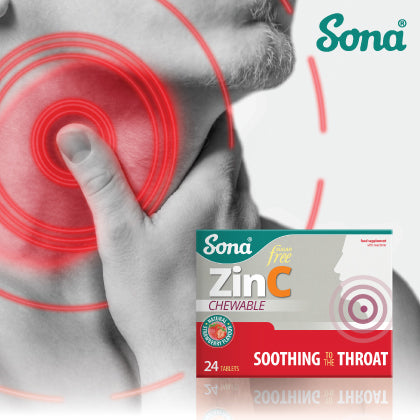
Zinc and vitamin C are two important nutrients that play a key role in nutrition, immune defense, and overall health maintenance. Research has demonstrated that taking both zinc and vitamin C together can effectively treat certain deficiencies cause by poor nutrition, certain diseases, medication, and pregnancy.
In this article you can find:
- What is zinc?
- What is vitamin C?
- What is the relationship between zinc and vitamin C?
What is zinc?
Zinc is essential for our health and affects almost every aspect of our health including, gene expression, enzymatic reactions, development and function of immune cells, protein production, DNA synthesis, cell growth and division, skin health, and wound healing. Zinc is an essential mineral as your body does not produce it on its own. Thereby, we must obtain zinc from our diet, or supplements. Food that generally contain high levels of zinc include oysters, red meat, poultry, beans, nuts, whole grains, and dairy products.
What is vitamin C?
Vitamin C is a unique type of vitamin because it also functions as a powerful antioxidant that protects your cells against potential damage. It is a water-soluble vitamin, meaning that it is carried to the body's tissues but not stored in the body, unlike fat-soluble vitamins which is stored in the body's fatty tissue. As a result, humans need to obtain vitamin C daily to maintain adequate levels for proper bodily function. Vitamin C plays a key role in some of the body’s most important functions such as, fighting against inflammation, regulating blood pressure, reducing the risk of heart disease, aiding in the absorption of iron, immune function, maintaining skin health, as well as reducing the symptoms or respiratory infections.
What is the relationship between zinc and vitamin C?
Supplementing with both zinc and vitamin C together can enhance immune function and reduce the risk of disease. For example, research has demonstrated that taking both vitamin C and zinc together can reduce the duration and severity of respiratory tract infections, such as the common-cold, in healthy individuals, rather than if they were taken alone. It is for this reason that it may be recommended to supplement with zinc and vitamin C in cold and flu season as well as during times of stress or exhaustion when your natural defenses may be weaker.
Sona ZinC chewable is a strawberry and vanilla flavoured chewable tablet containing 7mg of Zinc and 300mg of Vitamin C per lozenge. The action of sucking the tablets is soothing to the mouth and throat. Gently suck up to six tablets daily, or as directed by your health professional.
References
- Chambial, S., Dwivedi, S., Shukla, K., John, P., & Sharma, P. (2013). Vitamin C in Disease Prevention and Cure: An Overview. Indian Journal Of Clinical Biochemistry, 28(4), 314-328. doi: 10.1007/s12291-013-0375-3.
- Gupta, M., Mahajan, V., Mehta, K., & Chauhan, P. (2014). Zinc Therapy in Dermatology: A Review. Dermatology Research And Practice, 2014, 1-11. doi: 10.1155/2014/709152.
- Kumssa, D., Joy, E., Ander, E., Watts, M., Young, S., Walker, S., & Broadley, M. (2015). Dietary calcium and zinc deficiency risks are decreasing but remain prevalent. Scientific Reports, 5(1). doi: 10.1038/srep10974.
- Maggini, S., Beveridge, S., & Suter, M. (2012). A combination of high-dose vitamin C plus zinc for the common cold. The Journal of international medical research, 40(1), 28–42. https://doi.org/10.1177/147323001204000104.
- Office of Dietary Supplements - Zinc. (2021). Retrieved 12 July 2021, from https://ods.od.nih.gov/factsheets/%20Zinc-HealthProfessional//.
